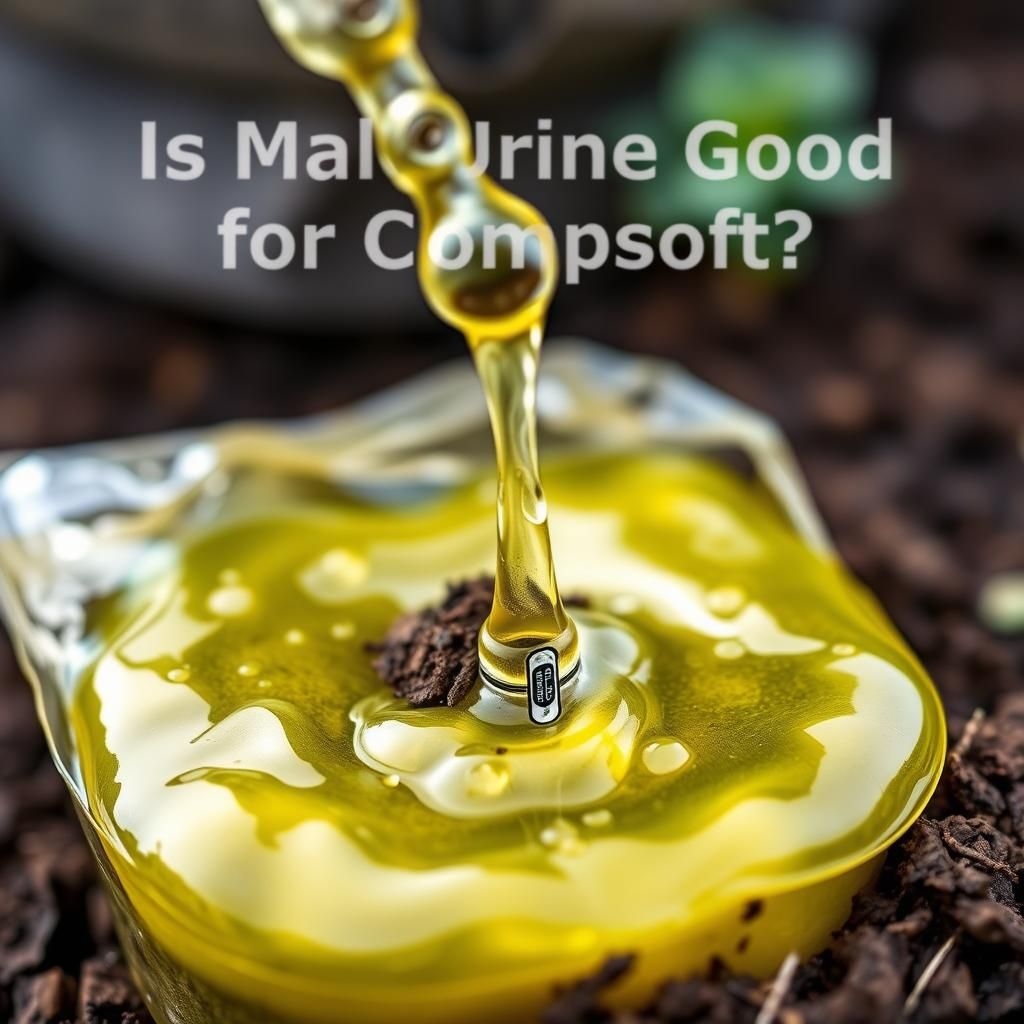Is Male Urine Good for Compost? Discover the Benefits and Risks of Using Urine in Your Garden

Urine, often dismissed as waste, has gained attention in sustainable gardening practices for its potential benefits as a compost additive. Rich in nitrogen and other essential nutrients, male urine can enhance soil fertility and promote healthy plant growth. However, its use in composting also raises concerns about pathogens and odors. This article explores the advantages and risks associated with incorporating male urine into your gardening routine. By understanding the appropriate methods and considerations, gardeners can make informed decisions about using this unconventional resource to create nutritious compost while promoting eco-friendly practices.
Is Male Urine Good for Compost?
Yes, male urine can be beneficial for composting due to its high nitrogen content, which is an essential nutrient for plant growth. When properly diluted, urine can help improve the overall nutrient balance in compost piles. It contributes organic material and can accelerate the decomposition process, leading to a more efficient composting cycle. However, it is important to use it in moderation and ensure that it is well-mixed with other compost materials to avoid any potential odor issues or nutrient imbalances.
Nutrient Composition of Male Urine
Male urine contains a variety of essential nutrients, primarily nitrogen, phosphorus, and potassium, which are crucial for plant health. The nitrogen content in urine can be significantly higher than many traditional fertilizers, making it a powerful addition to compost. Besides these primary nutrients, urine also contains micronutrients that can be beneficial for soil health, contributing to plant growth and resilience against diseases. Properly utilizing this nitrogen-rich substance can help promote robust microbial activity in the compost, enhancing its overall quality.
How to Use Male Urine in Composting
To effectively use male urine in composting, it is recommended to dilute it with water, usually in a ratio of about 1 part urine to 10 parts water. This dilution helps to balance the concentration of nitrogen and prevents potential scorching of plants when applied directly. When adding diluted urine to a compost pile, it should be evenly distributed and mixed thoroughly with other materials. This ensures a uniform incorporation and helps to prevent any strong odors from emanating from the compost pile.
Benefits Over Traditional Fertilizers
Using male urine in compost offers several advantages over traditional fertilizers. First, it is an abundant and inexpensive source of nutrients, making it an eco-friendly choice that promotes recycling of organic materials. Second, it does not contain the harmful chemicals and salts often found in synthetic fertilizers, thus reducing the risk of soil contamination and enhancing soil health. Moreover, the use of urine can help in reducing waste and lowering the carbon footprint associated with the production and transportation of commercial fertilizers, promoting a more sustainable gardening practice.
See also:
Potential Risks and Considerations
While male urine can be a valuable addition to compost, there are several potential risks to consider. It is critical to ensure that the urine is sourced from healthy individuals, as it can carry pathogens if the donor is ill. This is particularly important if the compost is intended for growing food crops. Additionally, excessive use of urine can lead to an overabundance of nitrogen, which may result in odor issues or attract pests. Therefore, moderation and careful management are vital when incorporating male urine into composting practices.
Comparison with Female Urine
Both male and female urine can be beneficial for compost; however, there are some distinctions in their composition. Male urine typically has a higher nitrogen concentration, while female urine may contain greater amounts of other nutrients due to hormonal differences. Regardless of gender, it's essential to dilute urine before adding it to compost, as both types can offer similar benefits in terms of enhancing nutrient content and microbial activity. Exploring the use of both male and female urine can provide a more diverse nutrient profile for compost, thus promoting better overall plant health.
| Aspect | Male Urine | Female Urine |
|---|---|---|
| Nitrogen Content | Higher | Lower |
| Pathogen Risk | Varies based on health | Varies based on health |
| Application Method | Diluted | Diluted |
| Benefits | High nitrogen | Balanced micronutrients |
| Odor Potential | Moderate | Lower |
Understanding the Nutrient Composition of Male Urine
Male urine is rich in nutrients that can be beneficial for composting and gardening applications. It primarily contains nitrogen, phosphorus, and potassium, which are essential for plant growth. When diluted properly, male urine can act as a natural fertilizer, enhancing soil fertility and promoting healthy plant development. However, it's crucial to balance the nutrient levels, as too much nitrogen can lead to burning plants or overwhelming the composting process. Additionally, using urine in moderation and following appropriate guidelines can mitigate risks associated with pathogens and odors, paving the way for its effective use in sustainable gardening practices.
Benefits of Using Male Urine in Compost
One of the key benefits of incorporating male urine into compost is its high nitrogen content, which is essential for the microbial processes that break down organic matter. This can accelerate the decomposition process, leading to faster production of rich compost. Furthermore, the presence of phosphorus and potassium in urine supports overall plant health, contributing to stronger root systems and improved crop yields. This natural fertilizer also promotes soil biology by enriching the microbial ecosystem, enhancing nutrient availability for future plant growth.
Risks of Using Male Urine in Compost
While male urine can provide numerous advantages in composting, there are also potential risks to consider. One concern is the possibility of pathogen transmission, as urine may carry harmful bacteria or viruses. To minimize this risk, it is recommended to age the urine before application, allowing any pathogens to die off. Additionally, if not properly diluted, the high levels of nitrogen can lead to burning and damage to plants, making it crucial to find the right balance when incorporating it into compost.
See also:
How to Properly Dilute Male Urine for Composting
To effectively utilize male urine in compost, proper dilution is essential. A common recommendation is to mix one part urine with about 10 parts water. This dilution not only reduces the intensity of the nitrogen but also helps minimize any foul odors that might arise during the composting process. Applying the diluted solution directly to the compost heap or the garden soil can ensure that the nutrients are spread evenly, allowing for better absorption by plants while preventing any negative impacts from concentrated urine.
Application Methods for Male Urine in the Garden
When applying male urine in the garden, various methods can be employed to maximize benefits while minimizing risks. One effective approach is to use a spray bottle or watering can to distribute the diluted urine evenly across the soil or foliage. It’s best to apply it during the early morning or late afternoon to reduce evaporation and maximize absorption. Additionally, rotating the application zones in the garden can prevent nutrient buildup in one area and promote an even distribution of fertilizers throughout the growing space.
Environmental Impact of Using Male Urine in Gardening
Using male urine as a fertilizer can have a positive environmental impact by reducing the reliance on synthetic fertilizers, which often contribute to water pollution through runoff. By recycling human waste, it not only minimizes waste but also close the nutrient loop within local ecosystems. Moreover, utilizing urine in composting helps promote sustainable gardening practices and encourages a more natural approach to cultivating plants, ultimately benefiting the environment while supporting a healthy garden.
Questions from Our Readers
Is male urine good for compost?
Yes, male urine can be beneficial for composting as it is rich in nitrogen, which is an essential nutrient for the growth of plants. However, it should be diluted with water before adding it to the compost heap to prevent an excess of nitrogen that could lead to an imbalance.
How should I dilute male urine for composting?
To properly dilute male urine, mix it with water in a ratio of about 1:10, which means one part urine to ten parts water. This dilution helps to avoid any potential odors and prevents burning of the plants due to high nitrogen content.
See also:
Are there any risks associated with using male urine in compost?
Although using male urine in compost is generally safe, there are risks if the urine is from individuals with infections or diseases, as pathogens may be present. It's crucial to ensure that the urine is from healthy individuals and to follow proper hygiene practices during collection.
Can male urine improve the composting process?
Yes, when used correctly, male urine can accelerate the composting process by providing essential nutrients and increasing microbial activity. This adds moisture and helps to break down organic materials more efficiently, resulting in high-quality compost.

If you want to read more articles like Is Male Urine Good for Compost? Discover the Benefits and Risks of Using Urine in Your Garden, we recommend you check out our Compost category.
Leave a Reply
Related Articles